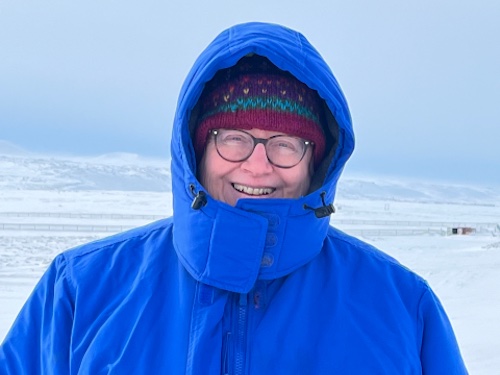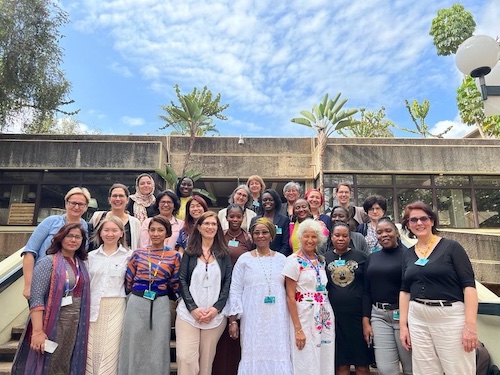Reflections in Honor of International Women’s Day

As I write this, a fierce blizzard is blowing on Sivuqaq, an Arctic island in the northern Bering Sea where Alaska Community Action on Toxics (ACAT) is conducting a community-based research project called Protecting Future Generations. This work was inspired by Annie Alowa, a respected elder and community health worker who witnessed health disparities among her people that she associated with the contamination left by the military at Northeast Cape.
In her work, Annie observed increases of cancers, reproductive diseases, and birth defects, especially among the families who traditionally used the lands and waters of Northeast Cape or who worked there. I am remembering Annie’s wisdom and foresight on this International Women’s Day, as her work continues to inform and motivate our research and advocacy work.
Annie died of cancer in 1997. She challenged us to carry on her work to hold the military and corporations accountable, to ensure responsible clean up, and to prevent further harm to the wildlife and people of this region. We bring this work to the Stockholm Convention, to support global bans on chemicals that affect Arctic Indigenous peoples who carry some of the highest body burden of persistent organic pollutants (POPs) of any population on Earth. The Arctic is a hemispheric sink for POPs. This is exacerbated by climate warming of the Arctic, a region warming at four times the rate of the rest of the planet.
Our work is dedicated to Annie’s memory. Our recent research confirmed higher levels of PCBs among the Northeast Cape families, elevated even more than levels in people of the Sivuqaq communities of Gambell and Savoonga. Our previous studies found that people in these two communities have four to six times the average PCB levels found people at lower latitudes, due to global transport of the toxic chemical into this Arctic region. We have also documented levels of PBDEs and PFAS chemicals in the people of Sivuqaq associated with thyroid dysfunction. Our research has also documented elevated levels of PCBs, pesticides, and certain PBDEs and PFAS chemicals in the traditional foods of the people of Sivuqaq.
In Sivuqaq this week we are collecting blood and nail samples from children aged two to twelve, because the elders and other community leaders of the Island are concerned about possible exposures that can affect their learning and development. We are concerned about the multigenerational effects of chemicals such as PCBs and flame retardants that are passed from mother to child in her womb and through breast milk. We remember that the nations of the world came together to negotiate the Stockholm Convention because of the elevated levels of POPs in the breast milk of Inuit women. We work to prevent this environmental violence that is perpetrated on women and our children without consent.
On International Women’s Day, we honor those women who are working all over the world to protect their children, their families, and communities from harmful exposures to toxic chemicals. Annie Alowa said: “I will fight until I melt.” Together, we join in solidarity with those who work for justice, for peace, and for the health and safety of present and future generations. In honor of the women of the world…
IPEN Co-Chair and Women’s Caucus Co-Chair

Women leaders attending a Strategic Approach to International Chemicals Management (SAICM) in February 2023, including Olga, Yuyun and Siddika
Honoring Women of IPEN
On International Women's Day, I would like to honour women from the IPEN network who fearlessly protect the most vulnerable, standing for their freedom and rights for a safe and clean environment. IPEN women live in different countries and regions, often facing injustice and threats from governments and corporations. Nevertheless, their strong desire to protect those in need helps them overcome challenges and find new opportunities to address toxic exposure from chemicals and waste.
Yuyun Ismawaty, my dear friend and a world-known leader fighting mercury pollution, has been standing for the health of Indonesian small-scale gold mining communities for years by protecting them from mercury exposure. Mercury is one of the major environmental pollutants. Many severe, irreversible, and deadly diseases are associated with mercury exposure. Even more troubling is that mercury can cross the placenta and accumulate in fetal tissues. Prenatal exposure to mercury poses a health threat, particularly to the developing brain. Being the first environment for children, women at the same time could unwillingly become a threat to their future babies and sometimes are blamed by their partners for giving birth to sick kids.
Yuyun dedicated her life to helping communities, educating families and local leaders about mercury health threats and available alternatives. She cares for children suffering from mercury exposure unwillingly passed to them by their mothers. Yuyun's tireless work helped generate data that justify the urgency of addressing mercury health effects in women involved in small-scale gold mining and living in contaminated communities. Preventive measures that she suggests could help reduce the exposure and save lives.
Women in IPEN are unique as they work with communities exposed to various toxic chemicals from different sources. Siddika Sultana, co-founder and Executive Director of the Environment and Social Development Organization (ESDO) in Bangladesh, is one of them. She has been working on gender issues since 1999 and specializes in women's rights, especially in the textile industry.
The textile industry is one of the biggest polluters on the planet. Hazardous chemicals are applied at nearly all stages of textile and clothing manufacturing, from raw material production to waste management. The problem caused by harmful chemicals used in the textile and clothing industry is linked to many diseases diagnosed both in women and in men occupied in the textile sector. However, some illnesses specifically target women and impact their health, including reproductive health. Noting that women workers dominate in this sector, it is essential to understand the health impact of textile chemicals on women and the link between chemical exposure and associated health effects.
While working with women in the textile sector, Siddika realized that women workers are treated differently than men. They are deprived of justice and treatment and cannot stay home if their kids are sick. To address these problems, Siddika cooperates with various organizations in Bangladesh, fighting for workers' rights and gender equality in the textile sector. She aims to raise awareness of women about their rights, occupational exposure to toxic chemicals, and the importance of gender equity.
There are many more examples of women's leadership in the IPEN network. They change the world for the best by fighting for people's rights, peace, healthy children and our planet's future. International Women’s Day allows us to celebrate their achievements and honour the work women do worldwide.
